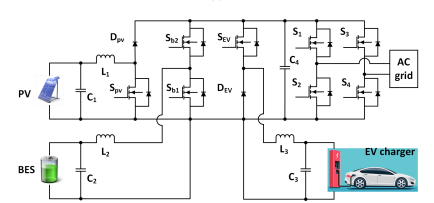Modeling and Control of a Multiport Converter based EV Charging Station with PV and Battery
Objective
The main aim of proposed method is, the combination of EV charging, PV generation, and BES enhances the stability and reliability of the power grid.
Abstract
This paper discusses the detailed modelling of a multiport converter based EV charging station integrated with PV power generation, and battery energy storage system, by using MATLAB/SIMULINK software. In this paper, the control scheme and combination of PV power generation, EV charging station, and battery energy storage (BES) provides improved stabilization including power gap balancing, peak shaving and valley filling, and voltage sag compensation. As a result, the influence on power grid is reduced due to the matching between daily charging demand and adequate daytime PV generation. Simulation results are presented to confirm the benefits at different modes of this proposed multiport EV charging circuits with the PV-BES configuration. Furthermore, SiC devices are employed to the EV charging station to further improve the efficiency. For different modes and functions, power losses and efficiency are investigated and compared in simulation with conventional Si devices based charging circuits.
Index Terms – EV charging station, PV, BES, power gap balancing, voltage sag compensation.
NOTE: Without the concern of our team, please don't submit to the college. This Abstract varies based on student requirements.
Block Diagram

Specifications
Software Configuration:
Operating System : Windows 7/8/10
Application Software : Matlab/Simulink
Hardware Configuration:
RAM : 8 GB
Processor : I3 / I5(Mostly prefer)
Learning Outcomes
- Introduction to Matlab/Simulink
- What is EISPACK & LINPACK
- How to start with MATLAB
- About Matlab language
- About tools & libraries
- Application of Matlab/Simulink
- About Matlab desktop
- Features of Matlab/Simulink
- Basics on Matlab/Simulink
- Introduction to controllers.
- Study of PWM techniques.
- Project Development Skills:
- Problem analyzing skills
- Problem solving skills
- Creativity and imaginary skills
- Programming skills
- Deployment
- Testing skills
- Debugging skills
- Project presentation skills
- Thesis writing skills


 Paper Publishing
Paper Publishing
